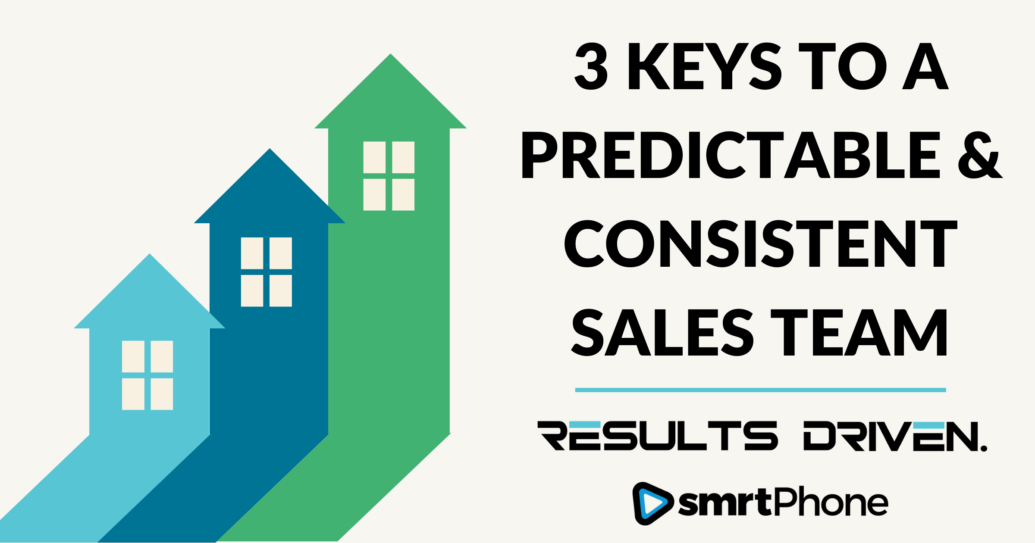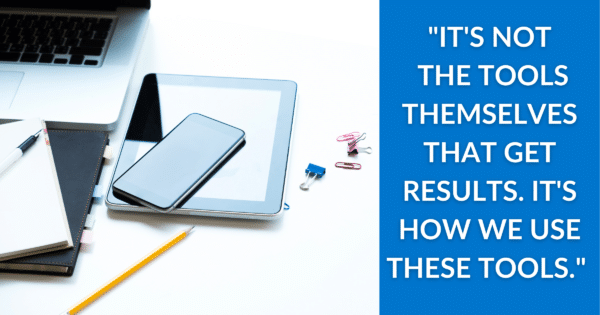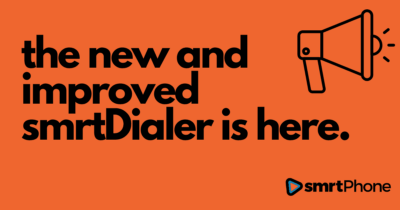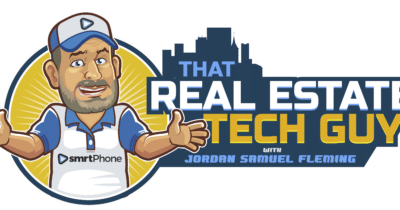Once a month we showcase expert advice from smrtPhone partners. This article was written by Josh High from Results Driven REI, a real estate investor education and coaching business that focuses on tools, onboarding training topics, and sales processes necessary to accelerate and scale your business to maximize income.
Build a Predicable and Consistent Sales Team for Real Estate Investing
Does this sound familiar? You’re trying to build consistent sales month-to-month, but everyone is fighting for the same deals. To make matters worse, every time a flipping seminar comes to town, more and more people start buying. Meanwhile your sales floor has become a revolving door where new onboarding doesn’t necessarily yield high performance. You wonder if it’s the new employees, the leads, the market?
Juggling whether to let someone go or hire on more salespeople can be stressful as you balance your overhead costs with the potential ROI. You want to produce consistent revenue to stay in business, without living in anxiety month-to-month. How do you strike this delicate balance between not over-hiring but getting consistent results from the team you do have?
Luckily, there’s a way! There are 3 critical components that will lead your team to success. We’ll focus on the tools you’ll need, how to optimize onboarding, and a step-by-step sales process that will allow you to “duplicate yourself” in order to scale. The goal is less anxiety, and more consistency in performance.
The Right Tools: CRM & Phone Systems
The most important tools for a phone sales team are their Customer Relationship Management system (CRM) and their phone system. It’s not the tools themselves that get the results, it’s how we use these tools. Imagine a carpenter with a saw and a drill: the fact that a carpenter has a saw and a drill does not make them a good or effective carpenter. It’s about how the carpenter uses these tools efficiently and effectively to complete the task at hand, and produce quality results.
Your CRM
A CRM helps keep salespeople on track by managing tasks and leads. There are a lot of options for CRMs, but in making a decision on which to go with, make sure it’s customizable. As you grow your business, things will change. Processes will break or shift and you will replace them with better, stronger processes. You may create new departments which will need their own workspaces, or grow in volume of both leads and employees. It’s important that your CRM is able to change and adapt with you over time.
Does your sales team come in daily and “check mark” tasks? If so, tasks can KILL the morale of a sales team. Imagine coming into work and you have a list of 100 people to call and follow up with. Most of these people you have reached out to a dozen times before, and as you get no answer, they keep getting pushed back onto the list for later in the week. You start to recognize the same names popping up regularly, and when you look at your list of follow-ups, you know that 80% of these 100 people are not going to pick up the phone. You’re frustrated that you need to call them again! You know the other 20% are hotter, that these are the people who always answer when you call. They are qualified prospects that need to be nurtured, and this top 20% are what fuels salespeople.
A better way to structure your follow ups would be to have your salespeople laser focused on this 20%. This allows them to focus on what they are best at, having quality conversations and closing more deals.
So what about the other 80%? This is where the phone system comes into play.
Your Phone System
If you’re aiming for consistency and efficiency, there are three critical features that your phone system must have: click-to-call, the ability to dial multiple phone numbers at one time, and call recording.
How much time do you think you or your team wastes in typing in every phone number as you go to call a prospect? 40-60 seconds? By having the click-to-call feature, you can make 2-3 dials in that same 40-60 seconds. This makes your team 2-3 times productive and means that one person can do what would have taken 2-3 people to do.
Now imagine the impact of a dialer that can call 3-4 people at one time. This would allow a salesperson to literally do 9-12 times the call volume that someone else physically typing in a phone number would be able to call. Less people doing more work means less overhead and more results! A multi-line dialer is perfect for those 80% follow ups that are harder to get on the phone. We can mass dial the groups of people who are less likely to answer, where our contact rate is lower, to help increase the overall conversations we would have had by just calling one by one.
Call recording is another way to capitalize on every closable opportunity. In order to scale, coaching your team will become hugely important. When you have recorded calls, you’re able to review the recordings with the individuals on your team, explain what they did well and break down where they can improve. Think of Michael Jordan, arguably the best basketball player of all time. Do you think his coaches said, “Michael, since you’re the best, you don’t need to do any film study.” No! Film study was a critical component to his development. He was able to see the areas of his game that he needed to improve and his relentless effort in working on these areas are what made him the best of all time. Your salespeople are not different and must review calls like Michael reviewed his game.
The Right Onboarding
Most people think that onboarding consists of handing someone a script, having them shadow for a few days and abracadabra: they are ready to go and expected to perform. But failing to onboard properly will ultimately lead to your new team member’s failure. The right onboarding is what sets them up for success.
Here is the content you must cover in the onboarding process:
- Who your ideal customer is, and what situations lead to sales
- What is and what isn’t a qualified opportunity – This must be clear!
- Psychology of sales: the ‘why’ and the theory behind everything that you say and do
- The scripts that you use (and reference the logic behind them!)
- Competing options your prospect may be considering
- The tools that will be used daily
- The documents they will be handling, IE in real estate you should train on every word and paragraph so that the agreement is completely understood
- Industry-specific terminology and acronyms
And here are some onboarding tips:
- Test how much of the information they are retaining with assessments and flashcards
- Role play
- During week 1, get on the phones and coach every conversation
Have A Step-by-Step Sales Process
Having a step-by-step sales process is the only way you’ll be able to train and onboard someone properly, and that process will still be important as you coach them for continued development throughout their time at your company. A large majority of people view sales as an artform, meaning you’re either a natural-born salesperson or you’ll never succeed in sales. This belief couldn’t be more incorrect!
Having a sales process will help change your sales from an inscrutable art to an applied science. Much like we can predict that 1 + 2 = 3, when you have a sales process, it becomes a numbers game and you can predict the outcome. And not only is it predictable –it’s teachable.
When you break down a sales process into steps, let’s say Introduction, Motivation, Property Condition and Set Up the Next Call, you can easily teach each individual component. You can then pull calls and see if each of the 4 steps were covered in the conversation. This is how you hold your team accountable, and it will provide clarity on areas of improvement that require more training.
About Results Driven REI
Tiffany and Josh have been in the real estate industry for over a decade. Tiffany originally began her career quickly climbing the corporate ladder in the Oil and Building Materials industries while Josh originally had a corporate career in commercial construction. In 2016, Tiffany & Josh came together, left their corporate careers and started Heels Homes. They started out as flippers and quickly branched into flipping & wholesaling hundreds of houses per year along with building a rental portfolio. Since the start of their real estate journey, they have also built a several other multi-million dollar companies along the way. They have amassed thousands of followers across social media where they teach others how to build wealth and freedom.
For more information on Results Driven REI, check out resultsdrivenrei.com
A message from Tiffany & Josh:
Our mission is to help business owners become wealthy without wearing all the hats and learning how to put infrastructure in place to build teams that allow you to scale without adding more chaos to your life. In order to build a company that can last through the test of time, you’ll need to automate your front end operation, incorporate daily, weekly and quarterly meeting rhythms, understand how to perform one on ones, sales team call audits, systemize every role and ultimately build teams that can operate with you being present every day. In order to scale, it requires infrastructure, teams and leadership.
We have proven that it’s possible to nurture and enjoy all aspects of life while building massive wealth through building teams the right way. Through building teams and building systems, we’ve been able to simultaneously build a few multi-million dollar companies at the same time.
Now, we want to share everything we’ve learned so that you can have the same freedom to continue to build the wealth you deserve! We encourage you to use the resources on this website and to start growing in all aspects of your life. Thank you for allowing us to help you on your journey.
Don’t hesitate, time to become more consistent!
Book a call with Josh to see if it would be a good fit!






